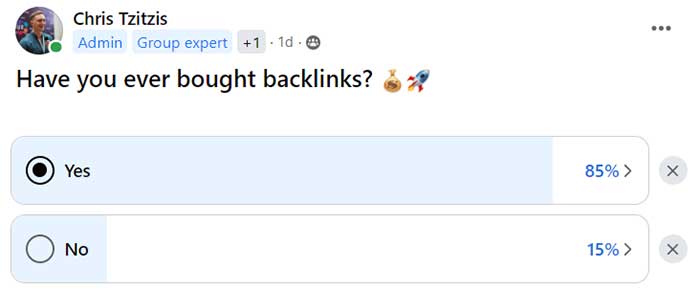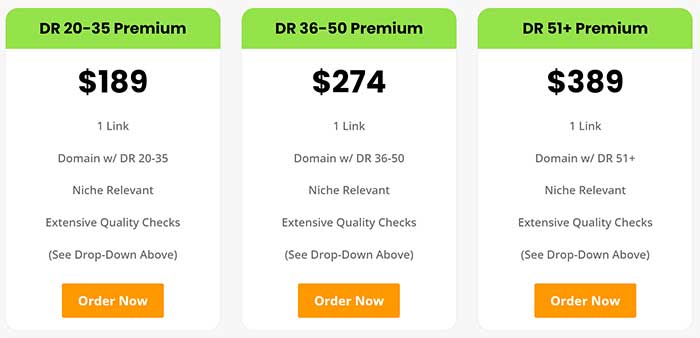According to a recent poll I conducted in the SEO Round Table on Facebook, 85% of SEO professionals have bought backlinks at one point or another.

This will come as no surprise to many, as pages with more backlinks generally get more organic search traffic from Google (Ahrefs).
But what’s up with buying links?
Can you simply buy backlinks without getting into any kind of trouble?
Will purchased backlinks actually help your rankings, and how can you go about buying quality backlinks that work without getting ripped off?
We’ll answer these questions and more as we dive into the world of paid link building.
Quick Summary
- Buying backlinks is a widespread SEO tactic that works
- The average backlink costs $361.44 (Ahrefs study)
- Focus on quality backlinks over quantity
- Link building agencies can be a massive help
- Always follow link building best practices for your site’s safety
- There are link-buying alternatives, but you might not like them
At SirLinksalot, we’ve sold thousands of links in the past year alone.
It’s what we do. We build backlinks for more than 1,400 brands in over 70 countries worldwide.
If you want to cut to the chase and buy backlinks from a trusted link building agency with a proven track record and case studies, see below to get started today.
Or stick around as we get into the nitty-gritty of buying backlinks. You’re sure to come out of this as a link-buying expert!
What is Link Buying?
Link buying is the process of paying for hyperlinks from other websites to your own, and this can involve dealing with webmastes directly or going through a link building agency.
Over the years, webmasters have learned that people will pay good money for backlinks as they are like the word-of-mouth of the internet – they vouch for your site’s credibility and can boost your SEO rankings.
While some businesses opt to buy backlinks, the process is definitely more nuanced than simply paying money for better search results.
But more on that in a bit.
Why Businesses Buy Backlinks
Businesses buy backlinks for one main reason – to improve their search engine rankings.
But other than that, there are some other reasons:
- Increased website authority
- Faster indexing
- Targeted referral traffic
- Brand exposure and awareness
- Competitive SEO advantage
- Save time
The opposite of buying backlinks would be creating content and sitting and waiting for them to come naturally.
Buying links attempts to speed up the process, bypassing the time and effort required by other approaches.
The Reality of Buying Links
Buying links is one of those things that everyone does but no one likes to talk about.
At our agency, clients can be anyone from a struggling newbie working on their first affiliate site to escape their 9-5 job to SEO leads at major brands everyone knows.
But it’s not always sunshine and rainbows.
Search engines, particularly Google, have systems in place to attempt to detect such practices and can neutralize bought links in some cases (and even give penalties in others).

That’s why you must develop a deep understanding of this topic before proceeding (or at the least, find a trusted link building partner).
What you’ll come to see is that buying backlinks that help you rank (and getting away with it) is actually much easier than Google and some others would like you to believe.
Do Paid Links Work?
The short answer is yes. Paid links do work.
When done correctly, it’s pretty much impossible for Google to tell if a link was bought or not.
Additionally, a link being paid or not has nothing to do with the authority, organic traffic, relevance, or usefulness of the domain the link is coming from.
That being said, not all paid links are created equal. Search engines have become more sophisticated and can recognize spammy or low-quality links, which could harm rather than boost your rankings.
And then there are even websites that clearly advertise that they are selling links!
The focus should always be on buying high-quality backlinks that are relevant and from reputable, healthy websites that are in good standing with Google.
When done right, buying backlinks can be one of the most powerful tools in your SEO arsenal.
How Much Do Links Cost?
The cost of buying links varies significantly depending on the quality of the sites you’re purchasing the links from.
Backlinks cost more or less depending on:
- The domain’s authority
- The domain’s traffic
- The domain’s niche
- The type of link placement
- How much the webmaster wants
- The type of website
You can see that our “Standard” guest posts have the following pricing based on authority (DR):

And our “Premium” tier is as follows:

The average link costs $361.44, according to Ahrefs. This is for a contextual link on a real website, such as paid guest posts or niche edits (editorial-type links).
At the high-end, PR links on more exclusive publications can cost more than $1,000 per link!
And then, on the low end, various sorts of pillow links, such as citations, could be less than $1 per backlink.
Our pillow link packs are $74 for 30 links, as these types of links can be created easily by anyone with enough time and know-how:

In general, you get what you pay for.
High authority backlinks from sites with a powerful backlink profile and solid reputation will cost more, and links from lower-end sites with little website traffic or sites with user-generated content will cost less.
Remember that in the world of link building, quality backlinks trump quantity, and search engines are increasingly good at discerning between the two.
If something seems too good to be true, it usually is! Be on the lookout for very cheap PBN links and spammed-out guest post sites.
Link Buying Safety
Navigating the world of backlink buying can feel like walking through a minefield full of scams and backlinks that could potentially harm your rankings.
In this section, we’ll go over everything you need to know to stay safe and keep those rankings moving up.
Is Buying Links Safe or Risky?
Buying links can be both safe and risky, depending on how it’s done.
Purchasing high-quality backlinks from reputable sites within your industry can be safe.
However, buying large amounts of low-quality links or not following link building best practices could land you in hot water with search engines.
More on both of these soon.
Google’s Stance On Buying Backlinks
Google has been clear about its stance on buying backlinks: it’s against their TOS.
Technically, even the most white-hat types of organic link building are still in violation, as they are being done with the goal of increasing their search engine rankings.

Those found in violation could receive manual link building penalties resulting in a loss of rankings.
However, we haven’t seen one of these penalties in years, and it seems like Google is just getting better at ignoring many backlinks that it deems unnatural.
Still, it’s very important to follow best practices and avoid low-quality links and sellers as much as possible.
Which Types of Backlinks Are Safe to Buy?
If you choose to buy backlinks, focus on quality. Some things to look for in linking domains are:
- Healthy websites
- Sites ranking for keywords
- Sites with some organic traffic
- Good metrics
- Contextual placements
- Relevant sites or articles
- Clean backlink profiles
- Clean external links
- Quality content
- User-generated content platforms (safe but not powerful)
- Sponsored content (safe but not powerful)
- DoFollow and NoFollow links are both OK
There’s more than that, but looking for these things will definitely keep you on the right path.
Also, you’ll need proper link building tools to get a lot of this information. These tools can have higher price tags in some cases, making getting links from an agency more compelling.
Types Of Links You Shouldn’t Purchase
Here are some things you should avoid like the plague when looking at linking domains:
- Websites hit by a Google penalty
- Huge losses in keywords and traffic
- Link farms
- Low-quality PBNs (private blog network)
- Irrelevant sites or articles
- Autogenerated backlinks
- Footer and sidebar links (non-contextual placements)
- Low or bad metrics
- Artificially inflated metrics
- Spammy backlink profiles
- Outbound links to sketchy sites
- Prior PBN use
- Low-quality content
- “Write for us” sites
- Anything that advertises that they sell links
It’s worth noting that having some backlinks with these qualities most likely won’t be the end of the world.
Google straight-up ignores a lot of bad links – you just won’t get any benefit from them.
Just make sure they don’t make up a significant part of your backlink profile, or your chances of having problems will increase significantly.
Buying Cheap Backlinks
As mentioned previously, you get what you pay for. We recommend you buy high quality backlinks instead of participating in low-end link schemes where website owners are obviously selling links.
While the low price tag may be tempting, cheap backlinks often come from low-quality or spammy sites and can do more harm than good.
These links can trigger penalties from search engines and harm your site’s credibility.

Remember, in the world of SEO, quality always beats quantity when talking about building long-term projects and sustainable results.
The obvious exception here is the various sorts of pillow links. Those are always cheap!
How To Buy Backlinks
If you decide to go the route of buying backlinks, it’s crucial to do so strategically.
Here’s exactly how to buy quality backlinks.
Find a Trustworthy Link Supplier
Just as you wouldn’t buy a car from a disreputable dealer, don’t buy backlinks from a shady supplier.
Look for a provider with a good reputation, transparent practices, and clear communication.
They should disclose where the links are coming from and offer quality backlinks that are relevant.
We’ve got a full article on link building services and agencies that is worth a read.
Figure Out How Many Links You Need
The number of backlinks you need depends on various factors, such as your current rankings, your current number of referring domains, your competitors, and your niche.
One way you can determine a ballpark number of backlinks you need to acquire is called “link gap analysis.”
To do this, look at how many referring domains your top competitors have compared to how many you have.
Be sure to filter out the low-quality links (DR > 5 and Traffic > 250 is a start) so you know how many quality links you will need to build or purchase.

Keep in mind that the number you reach is more of an estimate than anything.
Just because you get that many links doesn’t mean you will outrank your competitors. But it will definitely give you a realistic shot!
Establish A Link Building Timeline
Backlinks should be acquired over time, not all at once.
A sudden influx of links can look suspicious to search engines if not done properly, so you should establish a timeline for your link-building that mimics organic growth.
We’ve got another article on link building velocity here.
Link building should really be an ongoing process for as long as you own the website and are trying to push your rankings, but we suggest planning link building campaigns to last for six months to one year at the minimum.
Choose Types Of Links Or Services To Buy
Depending on your budget and needs, you can opt for individual links, link packages, or link-building services. Remember to prioritize quality and relevance over quantity.
Here are some different types of links and services you could purchase:
- Guest posts
- Link Insertions (Niche Edits)
- High-End PR Links
- HARO
- PBN Links
- Press Releases
- Pillow Links (Social Profiles, Citations, Web 2.0s, etc)
Each type of backlink has a different use case as well as pros and cons.
In general, link insertions and guest posts are the most popular types of backlinks used to power up domains, and then various sorts of Pillow Links are used to maintain link diversity.
You can view more on these different types of services here.
Decide On Target URLs
Your target URLs are the pages you want the backlinks to be directed to.
Some possible target URLs for your backlinks could be:
- Homepage
- Services pages
- Blog posts
- Category pages
- Product Pages
- Supporting content
- Hub pages (pages that link to many other pages)
- Or any other page you are trying to rank
It’s important to remember not to blast a single page repeatedly with links, as this can be seen as another unnatural signal by Google.
Determine Your Anchor Text
Anchor text is the clickable text in a hyperlink, and this is a very strong way to pass relevance.
Anchor text should be relevant to the target page and not overly stuffed with keywords, as this can look spammy to search engines.
It’s very important to maintain anchor text diversity and not use too many exact-match anchors. This is a huge unnatural signal to Google that many people get themselves into trouble with.
You should use some exact match anchors, but you should have a lot more of the natural stuff:
- Branded anchors
- URL anchors
- Generic anchors
- Topical anchors
- Long-tail anchors
- Partial-match anchors
When in doubt, it’s always better to use more natural, less aggressive anchors.
Is This All Over Your Head?
If all of this seems too complex or time-consuming, consider hiring an SEO professional or a link building agency to take care of it completely for you instead of ordering a la carte.

They can handle the complexities of link-building and ensure that your backlinks align with search engine best practices to avoid any potential problems.
Cutting Out The Middleman
If you want to take full control over your link buying process, you might consider cutting out the middleman and buying backlinks directly from site owners.
While this approach can be more labor and time-intensive, it can give you greater control over the quality and source of your links as well as save money over time.
You will need to invest in the necessary link building software and tools to do this and have the proper training, and the learning curve can be quite steep with the stakes being high.
While cutting out the agencies could be an option for some, we have to again stress the importance of following best practices and knowing what you are doing before trying to build links by going directly to the site owner.
Checking For Backlink Quality
As we’ve emphasized throughout this article, the quality of your backlinks is paramount.
To ensure you’re getting top-notch links, consider these things before buying:
The Legitimacy Of The Sites
Investigate the domains you’re buying backlinks from.
Do they look professional?
Is their content high-quality and relevant to your niche?
In general, look for things that would signal to you that the site has some purpose other than building links to sell (link farm).

Authority and Traffic
All SEO professionals have different metrics they like to use to gauge the quality of backlinks, but traffic and authority are the most popular ones.
We prefer Ahrefs’ measures of these things, but remember that these two scores should not be the end of your analysis.
We’ve already mentioned things to look for in the “safety” section already, but some other things you can investigate are:
- Relevance
- Page Authority
- Rankings
- Organic Keywords
- Link Tags
- Context
- Indexation
- Inbound/Outbound Spam
Find out more about what makes a quality backlink.
No Fishy Business
Make sure the domain is not engaging in any deceptive practices that make buying a link from them look more appealing than it really is.
Inflated authority and traffic metrics are common tactics that link farms can use to make more money selling links.
Always do your due diligence to ensure the website owner isn’t doing anything shady to get you to buy links.
DoFollow Vs. NoFollow
When buying links, prioritize ‘dofollow’ links as these are seen as high quality backlinks.
These links pass SEO value from the linking site to your site, helping to improve your rankings.
‘Nofollow’ links, on the other hand, do not pass SEO value (according to Google), and are therefore less valuable for link building purposes.

However, we have to say that we think Google is lying about this.
While we do recommend focusing on dofollow links, we think nofollow links can still have positive effects and are a welcome part of any link building campaign.
It’s ultimately up to the website owner to endorse your site with do follow links or not.
Following Link Building Best Practices
When you’re buying backlinks, adhering to link building best practices is crucial for success over the long term. Here are some essential principles to keep in mind.
Link Diversity
Just like a diverse investment portfolio is more robust, a diverse link profile is more credible to a search engine.
Link diversity refers to having backlinks from a variety of different sites, types of content, different domain TLDs, etc.
It’s an indicator of natural link building and helps ensure you don’t lose any of the rankings you’ve worked so hard for.
Natural Link Building Velocity
Rapid increases in the number of backlinks to your site can raise red flags for search engines if not done correctly.
A more natural link building velocity involves gradually acquiring links over time.
Remember, an SEO campaign is a marathon, not a sprint.
Anchor Text Diversity
Using varied anchor text for your backlinks appears more natural and less manipulative to search engines.
If all your backlinks use the same or similar anchor text, it may signal to search engines that you’re trying to game the system.
Target URLs
Instead of directing all backlinks to one page that you really want to rank, diversify your target URLs.
Linking to different pages on your website enhances your overall domain authority and improves the flow of link juice without creating unnatural signals for Google.
Link Building Case Studies
Case studies can provide valuable insight into the world of backlink buying.
Our link building case studies, for example, show exactly how we used our link building services to help achieve our clients’ goals in a clear step-by-step process.
They cover all of our decision-making processes and should be a great help for anyone looking to buy links.
Is Buying Backlinks a Good Idea for Your Business?
Whether buying backlinks is a good idea for you largely depends on your unique situation.

If you have the resources and expertise to ensure that your link buying is done strategically and discreetly, it can provide a major boost to your SEO while saving tons of time.
If you are short on funding but have excess time, building high quality links organically yourself could be a better option.
Just know that link buying is rampant in the SEO world, and depending on your niche, it may be absolutely crucial to stand a chance against your competitors.
Ethical Considerations for Purchasing Links
Purchasing links can be a contentious issue for some from an ethical standpoint.
It can be seen as an attempt to manipulate search rankings, undermining the idea of the internet as a level playing field.
However, as a counterargument, we think it provides a more level playing field by allowing smaller businesses to compete against larger businesses that naturally attract more backlinks due to being well-known.
This is especially true in the last few years as Google seems to be constantly moving in the direction of preferring more authority for the top positions.
Because of this, we believe link building services are a net good for the business community.
Alternatives to Buying Backlinks
Several alternatives to buying backlinks can be equally effective, but they require their own skill set that tends to be more involved than a quick transaction.
Most of these strategies involve creating high quality content that’s shareable (AKA content marketing).
For more alternatives, see our article on creating free backlinks.
Wrapping Up
In the rapidly changing digital landscape, buying backlinks remains a potent strategy to elevate your online visibility and bolster your website’s SEO.
When done correctly, investing in quality paid links can provide a much-needed boost to your website’s authority, relevance, and ultimately, its rankings in Google’s search results.
Just like any business investment, the key to success lies in focusing on quality over quantity and relevance over randomness.
It’s not about acquiring as many backlinks as you can but rather about cultivating meaningful connections with reputable websites in your niche.
Remember, the aim is to create a robust and sustainable search engine optimization and backlink strategy.
So follow best practices, avoid scams and shady dealers, and prepare to invest some time and money into what’s possibly the most important search engine ranking signal for search engines.
Build backlinks the right way. You won’t regret it!
Frequently Asked Questions
Is it legal to buy backlinks?
Yes, it’s legal to buy backlinks. However, it can be against search engine guidelines, such as Google’s, if done improperly or in a spammy way. So always be careful when you buy links!
Where to buy legit backlinks?
Legitimate backlinks can be bought from reputable SEO or link building agencies or directly from high-quality, relevant websites directly. It’s best to buy backlinks from trustworthy providers.
How much does a backlink cost?
A backlink costs $361.44 on average, according to Ahrefs. In reality, the cost of quality backlinks can be anywhere from $50 to $1,000+ per backlink. Backlinks cost more depending on a variety of factors, but some link building services could cost more for no reason at all.
How much should I pay for link building?
How much you pay for link building will depend on what niche you’re in and your competitors. It costs more to buy backlinks in niches with higher levels of competition, and it costs more to buy quality backlinks than if you were pursuing a backlink strategy involving low quality sites.
Is link building free?
Yes, link building is free in some cases. Pillow Links, for example, can be created for free by anyone with enough time and know-how. Guest posts and link insertions can be free, too, but the tactics required to pull these off require more finesse.
Are paid backlinks safe?
Paid backlinks are safe if they are from reputable sources, are relevant to your content, and don’t violate any of the things we listed previously in this article. Low-quality, spammy paid links may harm your site’s SEO. If you want to buy backlinks, always be sure to follow best-practices.
How do I get backlinks fast?
Getting backlinks quickly can be achieved through guest posting, buying them from site owners, engaging with influencers, or creating high quality content that others naturally want to link to. However, we don’t recommend trying to build links too quickly. Focus on quality backlinks instead.
Can you do SEO without backlinks?
Yes, you can do SEO without backlinks through on-page optimization, content quality, and user experience. However, backlinks are a significant factor in ranking, so they should not be overlooked.

